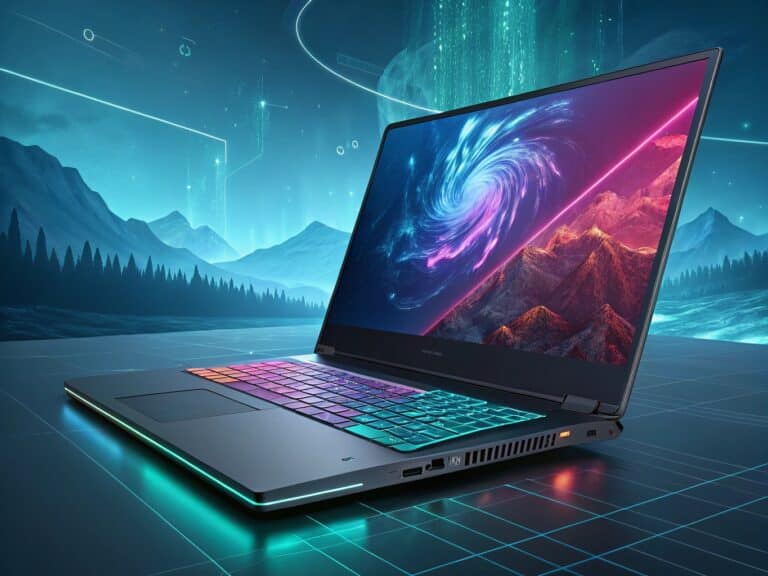AI laptops represent the next evolution in personal computing, offering three compelling advantages: enhanced productivity through intelligent automation, superior performance for demanding tasks, and future-proof technology investment. These specialized machines integrate Neural Processing Units (NPUs) that handle artificial intelligence workloads locally, transforming how we work, create, and interact with our devices.
The computing tech today is different – artificial intelligence moves from cloud-based applications to integrated hardware solutions. While online AI tools like ChatGPT and Google Gemini have introduced millions to AI capabilities, AI laptops bring this power directly to your fingertips with specialized hardware designed for intelligent computing tasks.
Understanding AI Laptop Technology
An AI laptop distinguishes itself from conventional computers through its Neural Processing Unit—a specialized chip that mimics neural networks to process artificial intelligence tasks efficiently. Unlike traditional processors that handle AI workloads as secondary functions, NPUs are purpose-built for machine learning operations, pattern recognition, and intelligent automation.
These machines combine advanced processors, dedicated graphics cards, enhanced memory configurations, and optimized storage systems. The integration allows AI laptops to perform complex computations without relying entirely on external servers, bringing AI processing power directly to users while maintaining data privacy and reducing latency.
Modern AI laptops feature architectures specifically designed to handle multiple AI-driven applications simultaneously. This specialized hardware foundation enables the three primary benefits that make these devices compelling for both professional and personal use.
Reason 1: Enhanced Productivity Through Intelligent Automation
AI laptops transform routine computing tasks through intelligent automation that adapts to user behavior and workflow patterns. Microsoft Copilot integration exemplifies this capability, automatically generating meeting summaries, creating presentation outlines, and managing complex data analysis across multiple applications.
The productivity gains extend beyond simple task automation. These systems understand context across different applications, linking information intelligently between programs. When working on video projects in Adobe Premiere, AI coordination ensures related files in After Effects and Audition remain synchronized automatically, eliminating manual tracking and reducing errors.
Email management becomes effortless as AI algorithms sort messages, prioritize responses, and suggest contextually appropriate replies. Document creation accelerates through intelligent suggestions for phrasing improvements, formula generation in spreadsheets, and automated formatting that maintains consistency across projects.
The contextual awareness represents a fundamental shift from traditional computing. Instead of treating each application as an isolated environment, AI laptops recognize relationships between tasks, automatically transferring relevant information and maintaining workflow continuity across different software environments.
Reason 2: Superior Performance for Demanding Creative and Technical Tasks
Creative professionals and technical workers benefit significantly from AI laptops’ enhanced processing capabilities. The Neural Processing Unit accelerates tasks like photo editing, video rendering, and code compilation without requiring high-end workstation hardware traditionally needed for such operations.
Color correction, object recognition, and noise reduction occur automatically with remarkable accuracy, dramatically reducing post-production time. Video editors can complete complex renders while continuing other work, as intelligent resource allocation ensures smooth multitasking performance even during intensive operations.
AI laptops excel at true multitasking rather than the task-switching behavior of conventional systems. Intelligent task management prioritizes application resources based on usage patterns and computational demands, enabling users to run multiple resource-intensive applications simultaneously without performance degradation.
Battery management systems optimize power distribution intelligently, extending operational time during demanding tasks. This efficiency allows mobile professionals to complete AI-intensive work without constant connection to power sources, maintaining productivity regardless of location.
The graphics capabilities of AI laptops support advanced visual applications through dedicated GPUs optimized for AI computations. These specialized graphics processors handle deep learning tasks, complex visual rendering, and accelerated AI calculations with superior efficiency compared to integrated graphics solutions.
Reason 3: Future-Proof Technology Investment
AI laptops represent strategic technology investments designed to accommodate evolving AI frameworks and emerging applications. The advanced processors, expanded memory capacities, and specialized components ensure compatibility with future AI tools and technologies as they develop.
Local AI processing capabilities address growing data security concerns by reducing dependence on cloud-based AI services. Sensitive information remains on the device during AI operations, providing enhanced privacy protection for personal data and confidential business information.
Software optimization comes pre-configured on many AI laptops, with machine learning frameworks like TensorFlow and PyTorch ready for immediate use. This preparation eliminates extensive setup time and ensures optimal performance from day one, allowing users to focus on projects rather than technical configuration.
The hardware architecture supports emerging AI applications that haven’t yet reached mainstream adoption. Natural language processing improvements, advanced voice recognition, and intelligent file management systems will benefit from existing NPU capabilities as software developers create new applications.
Battery life improvements and thermal management systems ensure sustained performance during extended AI workloads. These engineering advances maintain processing efficiency even during hours-long machine learning tasks or continuous AI-assisted work sessions.
Making the Investment Decision
While AI laptops command premium pricing compared to standard models, the performance advantages and future compatibility justify the investment for users with AI-intensive workflows. Professionals in data science, content creation, software development, and research fields will realize immediate productivity benefits.
The technology remains most valuable for users who regularly engage with AI applications beyond basic web-based tools. Those working with large datasets, complex visual projects, or specialized AI software will experience the greatest return on investment through enhanced performance and reduced processing times.
Current AI laptop models from manufacturers like ASUS, Lenovo, and Dell demonstrate impressive capabilities while maintaining portability and battery life comparable to premium conventional laptops. The integration of AI features doesn’t compromise traditional computing performance, ensuring these devices excel at standard computing tasks as well.
- Microsoft Expands AI Features Across Intel and AMD-Powered Copilot Plus PCs
- The Intersection of AI and Quantum Computing
- Neuromorphic Computing: Learn About AI Mimicking the Human Brain
- Rapid AI Development: 3 Key Reasons
Sources: Asus, Consumer Reports, Dev
Written by Alius Noreika

